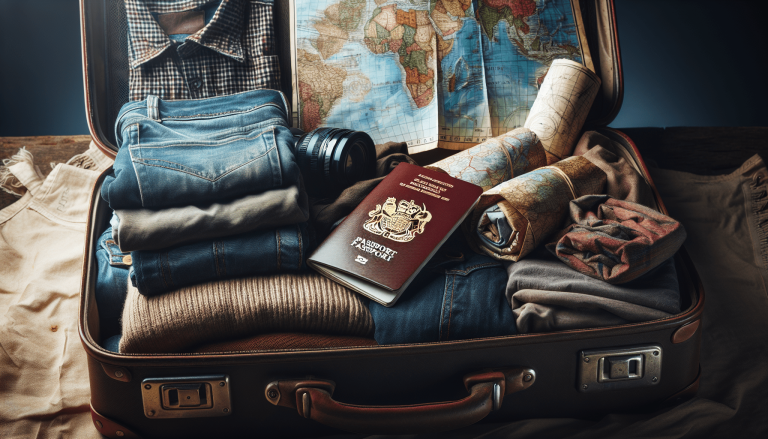Student Budget Travel: Exploring The World On A College Budget
Are you a college student itching to explore the world but worried about your tight budget? Look no further! In this article, we will share some valuable tips and tricks on how to make the most out of your travel experience without breaking the bank. From budget-friendly destination recommendations to savvy travel planning advice, we’ve got you covered. Get ready to embark on unforgettable adventures while still keeping your wallet happy. So, grab your backpack and let’s start exploring the world on a college budget!
Understanding Student Budget TravelDefinition and purpose of student budget travel
Student budget travel refers to the practice of traveling on a limited budget specifically targeted towards students. It is a way for students to explore the world, gain new experiences, and broaden their horizons without breaking the bank. The purpose of student budget travel is to make travel more accessible and affordable for students who may have limited financial resources. It allows them to experience different cultures, learn about history and art, and meet new people, all while managing their expenses and staying within a tight budget.
The growth and popularity of student budget travel
In recent years, student budget travel has become increasingly popular due to its affordability and the desire of students to have meaningful experiences outside of their academic lives. The growth of budget airlines, online travel agencies, and accommodation-sharing platforms has made it easier than ever for students to find affordable travel options. Additionally, the rise of social media and travel blogs has inspired and encouraged students to explore the world on a budget. With the availability of resources and the increasing desire for travel experiences, student budget travel has gained traction and continues to grow in popularity.
Planning for Student Budget TravelStart planning early
When it comes to student budget travel, early planning is key. By starting the planning process early, you have more time to research and find the best deals on flights, accommodations, and activities. This also allows you to take advantage of any early bird discounts or promotions. Additionally, planning ahead gives you the opportunity to save money specifically for your travel expenses and ensures that you have enough time to fulfill any necessary requirements, such as obtaining a passport or visa.
Establishing a travel budget
Before embarking on any trip, it is important to establish a travel budget. Determine how much money you are willing to spend and allocate funds for different aspects of your trip, such as transportation, accommodation, meals, and activities. Be realistic about your budget and consider any additional expenses, such as travel insurance or visa fees. Having a clear budget in mind will help you make informed decisions and avoid overspending during your trip.
Deciding travel destinations
Choosing the right travel destinations is crucial for student budget travel. Look for destinations that are known for their affordability, such as Southeast Asia, Eastern Europe, or South America. These regions often offer a lower cost of living and cheaper accommodations and food. Additionally, consider the exchange rate of the destination you are considering, as this can greatly impact your budget. Research various destinations, their cultural offerings, and the experiences they offer to determine which ones align with your interests and budget.
Research travel discounts for students
One of the benefits of being a student is access to various travel discounts. Many airlines, attractions, and accommodations offer special rates or promotions specifically for students. Take the time to research and compare different discounts available to you. Look for student airfare discounts, student travel cards, and student discount programs that provide savings on transportation, accommodation, and activities. Utilizing these discounts can significantly reduce your travel expenses and allow you to make the most of your budget.
Choosing Destinations for Student Budget TravelLooking for affordable destinations
When choosing destinations for student budget travel, affordability should be a primary consideration. Look for countries or cities where the cost of living is relatively low, as this will significantly impact your overall expenses. Consider destinations in Southeast Asia, such as Thailand or Vietnam, where accommodations, food, and transportation are generally more affordable. Eastern European countries like Hungary or Poland are also known for their budget-friendly offerings. By choosing affordable destinations, you can stretch your budget and have more money to spend on experiences.
Comparing costs between different destinations
Comparing costs between different destinations is essential to find the most budget-friendly option. Take into account factors such as accommodation prices, transportation costs within the country, and the cost of meals and activities. Consider creating a spreadsheet or using online tools to compare the costs of different destinations side by side. This will allow you to make an informed decision based on your budget and the experiences you want to have.
Consideration of safety, attractions, and educational value
While affordability is important, it is also crucial to consider other factors when choosing destinations for student budget travel. Safety should always be a top priority, especially for solo travelers. Research the safety ratings and travel advisories for the destinations you are considering and choose places that have a good track record for tourist safety. Additionally, consider the attractions and cultural offerings of each destination. Look for places that offer a mix of historical sites, natural beauty, and cultural experiences. Lastly, consider the educational value of each destination. Look for places that offer opportunities for learning and personal growth, such as museums, cultural centers, or volunteering programs.
Booking Travel TicketsWatching for flight deals
To save money on travel tickets, it is essential to be vigilant and keep an eye out for flight deals. Sign up for newsletters or follow social media accounts of airlines, online travel agencies, and flight deal websites. This way, you will be notified of any special promotions or discounts. Be flexible with your travel dates and consider traveling during off-peak seasons when prices tend to be lower. By being proactive and patient, you can snag great deals on flights and significantly reduce your travel expenses.
Booking during off-peak times
Booking your travel tickets during off-peak times can result in significant savings. Avoid popular travel periods such as school holidays, major events, or peak tourist seasons, when prices tend to be higher. Instead, consider traveling during shoulder seasons or weekdays when demand is lower and prices are more affordable. Additionally, be flexible with your departure dates and consider booking flights with layovers or indirect routes, as these can sometimes be cheaper than direct flights.
Utilizing student travel organizations
Student travel organizations can be valuable resources for finding affordable travel tickets. Many student organizations offer discounted rates on flights specifically for students. Look for organizations such as STA Travel or StudentUniverse, which specialize in providing student travel deals. These organizations often have partnerships with airlines or travel agencies that offer exclusive discounts. Utilizing these organizations can help you find the best deals and save money on your travel tickets.
Finding Affordable AccommodationsStay in hostels or budget hotels
Hostels and budget hotels are excellent options for student budget travel as they are often more affordable than traditional hotels. Hostels provide dormitory-style accommodations, where you can share a room with other travelers, thereby reducing the cost per night. Many hostels also offer private rooms at a higher price point for those who prefer more privacy. Budget hotels, on the other hand, provide basic but comfortable accommodations at affordable rates. When choosing hostels or budget hotels, read reviews and consider the location, amenities, and safety before making a booking.
Consider workaway or volunteering for free accommodation
If you’re open to alternative experiences, consider workaway or volunteering opportunities that offer free accommodation in exchange for work. Workaway is a platform that connects travelers with hosts who offer food and accommodation in exchange for help with various tasks, such as gardening, language teaching, or animal care. Volunteering programs, on the other hand, allow you to contribute to a cause while receiving free accommodations. These options not only save you money on accommodation but also provide unique opportunities to immerse yourself in local cultures and communities.
Bunking with locals or fellow travelers
Another option for affordable accommodations is to stay with locals or fellow travelers through services like Couchsurfing or Airbnb. Couchsurfing allows you to stay for free in someone’s home, while Airbnb offers various types of accommodations at different price points. Staying with locals or fellow travelers not only saves you money but also provides the opportunity to connect with people who can share insider tips and advice about the destination. Before choosing this option, always read reviews and confirm the safety and credibility of the host.
Budgeting Tips for On-Ground ExpensesFocusing on local and street foods
One of the best ways to save money on food while traveling on a budget is to eat like a local. Skip the touristy restaurants and opt for local eateries or street food stalls. Not only are these options often more affordable, but they also provide an opportunity to sample authentic local cuisine. Additionally, consider grocery shopping and preparing some of your meals, especially breakfast or lunch, which can be cheaper than eating out for every meal.
Utilizing public transportation over taxis
Using public transportation is not only more budget-friendly but also allows you to experience the local way of getting around. Research the public transportation options available at your destination, such as buses, trains, or trams, and familiarize yourself with their routes and schedules. Public transportation is often cheaper than taking taxis or rideshares and can save you a significant amount of money during your trip. If walking is feasible and safe, consider exploring the city on foot to save even more on transportation costs.
Visiting free attractions and activities
Many destinations offer a variety of free attractions and activities that can be just as rewarding as paid experiences. Research the free attractions available at your destination, such as parks, museums with free admission days, or walking tours. Take advantage of these opportunities to explore the city, learn about its culture and history, and interact with locals. Additionally, look for free or low-cost cultural events, festivals, or performances happening during your visit. By focusing on free attractions and activities, you can stretch your budget and make the most of your travel experience.
Making the Most of Student DiscountsDiscovering global student discount programs
Many countries and organizations offer global student discount programs that provide savings on transportation, accommodations, attractions, and more. One such program is the International Student Identity Card (ISIC), which offers discounts in over 130 countries. Research and apply for relevant student discount programs before your trip to maximize your savings. These programs often require proof of enrollment, so make sure to have your student ID or enrollment certificate readily available.
Always have your student ID
Having your student ID with you at all times can be beneficial for accessing student discounts, even if you are not enrolled in a specific student discount program. Many attractions, museums, and transportation services offer discounted rates with a valid student ID. Additionally, some destinations have student-specific tickets or passes that are only available to those with a student ID. Always carry your student ID with you and inquire about student discounts wherever you go.
Using ISIC cards
As mentioned earlier, the International Student Identity Card (ISIC) offers a multitude of discounts for students traveling abroad. The ISIC card is recognized globally and offers discounts on various aspects of travel, including accommodation, transportation, attractions, and more. It is worth investing in an ISIC card if you plan to travel extensively as a student. The card not only gives you access to discounts but also serves as a form of identification while traveling. Check the ISIC website for more information on how to obtain and use an ISIC card.
Travel Insurance for StudentsImportance of travel insurance for students
Travel insurance is essential for all travelers, and students are no exception. Having travel insurance provides financial protection in case of unexpected events such as medical emergencies, trip cancellations, lost or stolen belongings, or travel delays. As a student, you may have a limited budget, and unexpected expenses can be financially devastating. Travel insurance offers peace of mind and ensures that you are covered in case of unforeseen circumstances, allowing you to focus on enjoying your trip without worrying about potential financial burdens.
Finding affordable travel insurance options
While travel insurance is important, it doesn’t have to break the bank. Many insurance providers offer affordable travel insurance options specifically tailored for students. Take the time to research and compare different insurance plans to find one that fits your needs and budget. Look for insurance providers that offer comprehensive coverage at reasonable prices. Additionally, consider student-specific insurance providers or insurance plans offered by your educational institution, as these may have special rates or coverage options for students.
Understanding what is and isn’t covered
Before purchasing travel insurance, it is crucial to understand what is and isn’t covered by the policy. Read the policy thoroughly and ask questions if there is anything you are unsure about. Pay attention to coverage limits, exclusions, and any additional coverage options you may need, such as coverage for adventurous activities or pre-existing medical conditions. By understanding the specifics of your insurance coverage, you can make informed decisions and ensure that you are adequately protected during your travels.
Cultivating Travel SavvinessLearning a bit of the local language
Learning a few basic phrases in the local language can go a long way in enhancing your travel experience. It shows respect for the local culture and can help you navigate and communicate more effectively. Invest some time in learning common greetings, phrases for ordering food, and asking for directions. Not only will this make your interactions with locals more meaningful, but it can also potentially help you save money by avoiding tourist traps and negotiating better prices.
Getting familiar with local customs
Being aware of and respecting local customs is essential when traveling abroad. Each destination has its own unique customs, traditions, and etiquette. Research and familiarize yourself with the cultural norms of the country you are visiting to avoid unintentionally offending locals or disregarding their customs. This can include dress codes, table manners, greetings, and appropriate behavior in religious or sacred sites. By showing respect for the local customs, you not only have a more immersive cultural experience but also make a positive impact as a responsible traveler.
Staying safe and aware while traveling abroad
Safety should always be a priority while traveling, especially for students exploring unfamiliar destinations. Research the safety situation of the countries or cities you plan to visit and take necessary precautions. Register with your country’s embassy or consulate before your trip to receive travel updates and alerts. Be cautious of your surroundings, avoid risky behaviors, and take appropriate safety measures such as securing your belongings and using reputable transportation services. Additionally, it is advisable to share your travel itinerary with someone back home and keep copies of important documents in a separate location in case of emergencies.
Returning Home: Managing Post-Travel FinancesStep-by-step guide to financial recovery after traveling
Returning home after a trip can bring about financial challenges, especially if you have exceeded your budget. To manage your post-travel finances effectively, create a step-by-step plan for financial recovery. Start by assessing your expenses and documenting any outstanding bills or debts. Prioritize payment of any overdue bills to avoid unnecessary penalties or fees. Next, create a post-travel budget that allows you to slowly replenish your savings while managing your regular expenses. Consider cutting back on non-essential spending and exploring opportunities to earn additional income if necessary. Stay disciplined and stick to your budget until you have fully recovered financially.
Creating a post-travel budget
A post-travel budget is essential for managing your finances after returning from a trip. Start by assessing your current financial situation and identifying any additional expenses or outstanding debts that need to be addressed. Evaluate your monthly income and regular expenses to determine how much money you can allocate towards recovering from your travel expenses. Prioritize essential expenses and cut back on non-essential spending to free up additional funds. Consider setting aside a portion of your income specifically designated for travel savings to ensure that you are consistently preparing for future travel adventures.
Planning for the next travel
While managing your post-travel finances, it is never too early to start planning for your next travel adventure. If traveling is a priority for you, create a savings plan specifically dedicated to funding your future trips. Set realistic and achievable travel goals, and determine how much money you need to save each month to reach those goals. Research budgeting tips and strategies to help you save money efficiently. Look for opportunities to earn extra income or consider part-time work specifically geared towards funding your travel adventures. By planning ahead, you can ensure that your future travels are financially feasible and continue to explore the world on a student budget.







